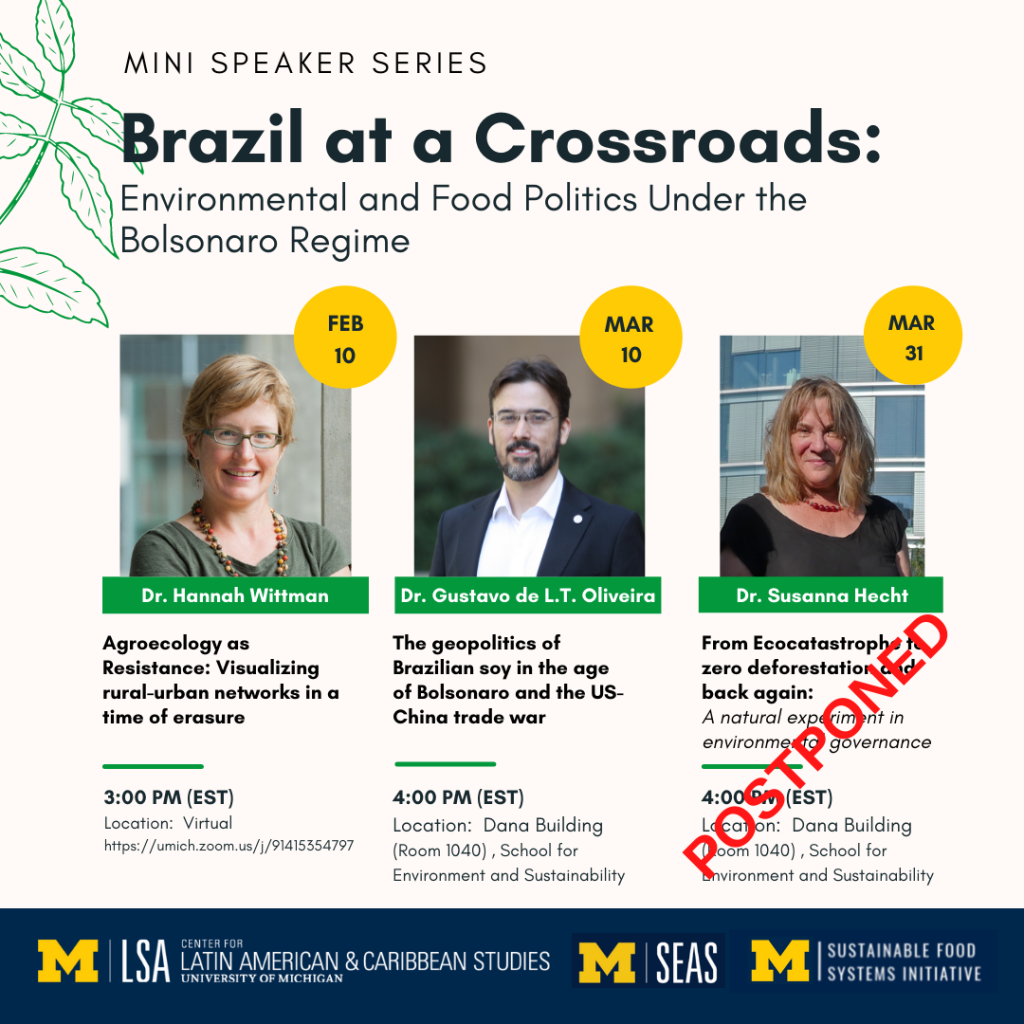SFSI is partnering with LACS to host a mini speaker series with Dr. Hannah Wittman (Feb 10), Dr. Gustavo Oliveira (March 10) and Dr. Susanna Hecht (POSTPONED – March 31). Join us!
When Jair Bolsonaro, a right wing populist, was elected as Brazil’s president in 2018, people began wondering about the consequences of that election for the environment, food systems, and trade, among many other social and ecological issues. In this lecture series, Hannah Wittman, Gustavo Oliveira, and Susanna Hecht will explore the impacts of the Bolsonaro regime on food security and agroecology, on the conservation of the Amazon forest, and on international trade with China, as well as bright spots of resistance and innovation towards sustainability.

Dr. Hannah Wittman
Agroecology as Resistance: Visualizing rural-urban networks in a time of erasure
Watch the recording here
Agroecological transitions in Brazil are challenged by inequitable access to land, contested politics about how to “feed the world while cooling the planet” and high levels of uncertainty on how to adapt to changing markets, consumer dietary preferences, and climate change. Using examples from participatory research on digital agroecoloigcal certification in Brazil, I examine the potential of a new grassroots science that aims to make diverse, equitable, and sustainable agroecological landscapes legible, to support both political recognition of agroecology and solidarity networks between rural and urban communities.
Dr. Gustavo de L.T. Oliveira
The geopolitics of Brazilian soy in the age of Bolsonaro and the US-China trade war
Soy plays a major role in the development of Brazilian agribusiness, and in turn in Brazilian geopolitical power as well. It is the basis for much Brazilian land ownership in neighboring countries, and extension of political influence in Africa. It was also instrumental in Brazil’s insertion into a “new multi-polar world order”, balancing trade with China even while the US dollar and North Atlantic transnational companies maintained control over soybean markets. But recent events call for a reevaluation of the geopolitics of Brazilian soy. First, access to abundant Brazilian soy enabled China to withstand the trade war with the US, responding with counter-tariffs on US soy. But while this could have enabled Brazil to extract geopolitical gains, the election of Jair Bolsonaro as president of Brazil fractured the political power of the soy sector. While, soy farmers and truckers defend Bolsonaro’s domestic and international agenda, restraining ties with China and accusing Europeans of blocking Brazilian development through environmentalist charades, soy processing and trading companies have broken with Bolsonaro, who undermines their efforts to attract Chinese capital for infrastructure construction in Brazil while projecting a palatable eco-modernist image of Brazilian agribusiness for European markets. Thus, a critical geopolitics of Brazilian soy calls for more nuanced account of the transnational class articulations and global environmental politics that shape and are shaped by this extraordinary oilseed.
4pm EST
Location: Dana Building (Room 1040), School for Environment and Sustainability
POSTPONED Dr. Susanna Hecht
From Ecocatastrophe to zero deforestation and back again: A natural experiment in environmental governance
From 2004 to 2012 Brazilian deforestation dropped by 80%. This involved several institutional, political and market dynamics that structured “socioambientalism” as part of the development practice for Amazonia. While widely lauded, several other “adverse forces” were at work, and in any case, the cerrado (Brazilian savanna) was falling under the tractors of massive soy and sugar expansion. With the rise of Micheal Temer, and the election of Jair Bolsonaro, the configuration and politics changed dramatically. The central question now is whether processes that support forests and forest livelihoods can be reactivated? For a number of reasons, probably not.
4pm
Location: Dana Building (Room 1040), School for Environment and Sustainability


